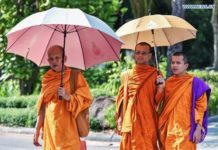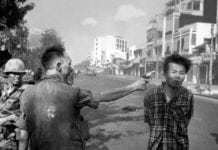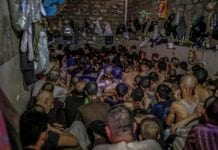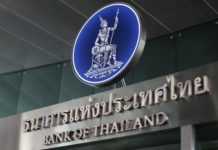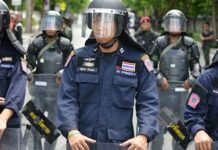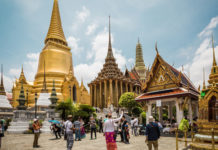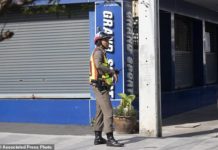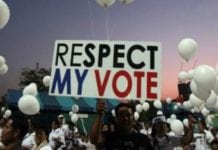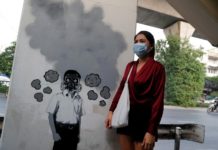In Thailand many members of the country’s military are beginning to show dissent and are taking sides with protesters in the demand for DEMOCRACY.
Army Sergeant Ekkachai Wangkaphan is one of them. “Down with dictatorship,” he wrote on Facebook under a news story about a jailed activist, a week before the protest.
On the day of the protest, July 18, he shared a livestream and pictures with the hashtag of the Free Youth protest group.
A few weeks later, he shared a photo of a protester carrying a placard saying “The country where you speak the truth and you go to jail.”
His superiors in the Royal Thai Army warned him to stop. But he had already made up his mind to quit and left the army in October.
“When the protests escalated, orders to prohibit social media posts came in more often,” Ekkachai, 33, told Reuters in an interview. “They want to nip it in the bud, but they can’t.”
Social media is exposing discontent among some soldiers, police and civil servants after months of protests against Prime Minister Prayuth Chan-ocha and the monarchy of King Maha Vajiralongkorn.
Although Thai soldiers have occasionally expressed sympathy for protesters in past bouts of political unrest, the rapid expansion of social media is making it difficult to contain.
Reuters reviewed dozens of social media posts and messages on chat groups used by soldiers and police and found many expressing sympathy with protesters and anger or unease over the way those who oppose the government are being treated. Some posted about their loyalty to Thailand’s institutions.
It is impossible to establish how far disaffection reaches based on social media activity. But the posts have attracted the attention of authorities.
In the latest threat Colonel Sirijan Ngathong, the army’s deputy spokeswoman, said ‘If you are posting things that are creating misunderstanding and provocation that would create instability, that is inappropriate.’
She added that commanding officers were reviewing the social media activity of soldiers to prevent breaches of army rules.
She did not respond to requests for comment on the case involving Ekkachai or whether surveillance had increased since protests escalated in July.
She may well have to tread carefully. Because without the support of the grunts, the Thai military have nothing at all.
And it is clear, they are losing many of them.
Some posts appeared on the viral video-sharing app TikTok. One TikTok video, now removed, showed a soldier giving the three-fingered salute, a gesture of resistance featured in “The Hunger Games” film that Thailand’s student-led, anti-government protest movement adopted. “Keep up the struggle, Thai brothers and sisters,” said the caption.
The video’s author told Reuters that he is a serving professional soldier but asked that his name not be used.
Some sections of the army have intensified their clampdown. A message posted by a coordinator in a private chat group used by officers in one artillery regiment, reviewed by Reuters, prohibited soldiers from joining protests or giving any political opinions on social media.
“After finding political expressions that were not suitable, commanders are asked to consider and rectify accordingly and to explain the political situation correctly to troops,” the message said.
The army did not respond to a request for comment on the message.
It is unclear if disaffection will affect the protests or the way the government is able to respond to them.
Government spokesman Anucha Burapachaisri declined to comment on disaffection among members of the security forces or civil service, saying only that the country should be focused on dialogue between those with different views. (continued below)
The Thai Army
The army plays a pivotal role in Thailand, which has been ruled by serving or former military officers for more than two-thirds of the time since the end of absolute monarchy in 1932.
Thailand’s army has seized power 13 times since then and has on several occasions been involved in bloody crackdowns on protesters including in 1973, 1976, 1992 and 2010.
Although many of the coups have had the broad support of the armed forces, cracks in the military have been exposed in the past.
During a bloody 2010 crackdown on red-shirted anti-government protesters in Bangkok, some green-uniformed soldiers openly sympathized with the demonstrators, tipping off the group’s leaders ahead of a planned army operation.
They were dubbed “watermelons” – green on the outside with red sympathies on the inside.
That same year, rogue general Khattiya Sawasdipol – known as “Seh Daeng” or “Commander Red” – was assassinated after he came out in support of anti-government protesters, showing that displays of disloyalty in the Thai military can be dangerous.
“Security forces, especially those who have to confront the protesters, are in a stressful position,” said Kiranee Tammapiban-udom of government consultancy Maverick Consulting Group. They have to follow orders but at the same time are branded “servants of tyranny” by protesters, she said.
One protest leader, Tattep Ruangprapaikitseree, said he encouraged security forces to disobey orders. “Turn your backs to your commanders, the regime will collapse,” he told Reuters.
Another soldier who had also posted on social media said he was looking to defuse tension rather than escalate it. “Maybe it’s time for the older generation to listen to the young,” he said.
“Asking Prayuth to quit and for changes to the constitution is not abolishing the monarchy.”

